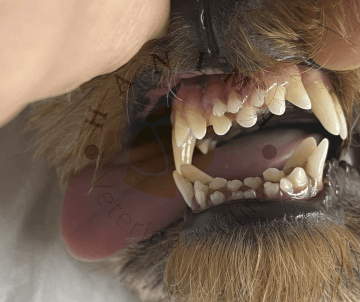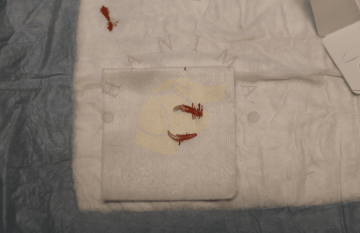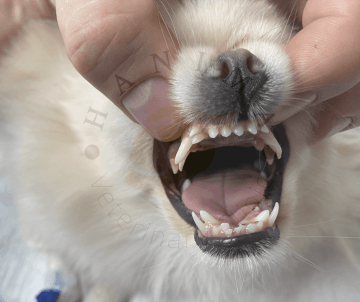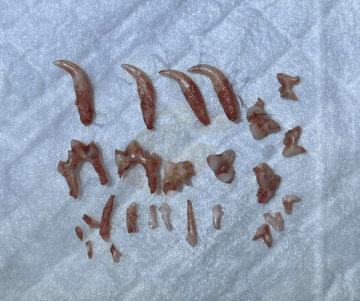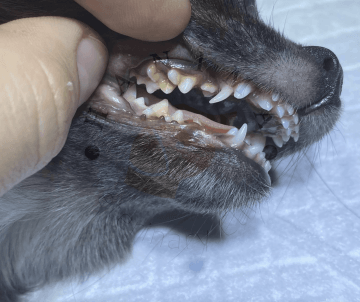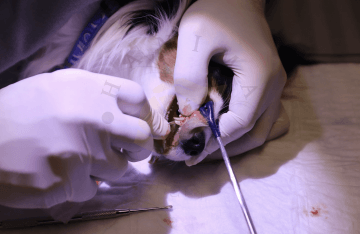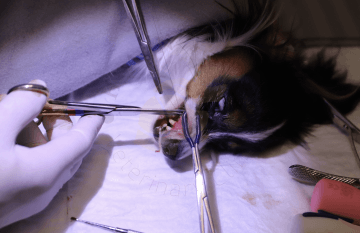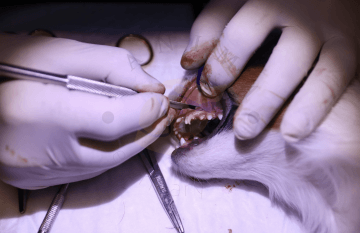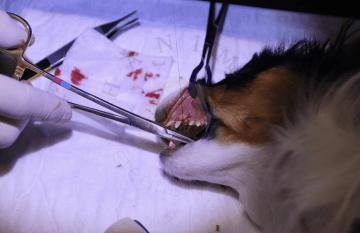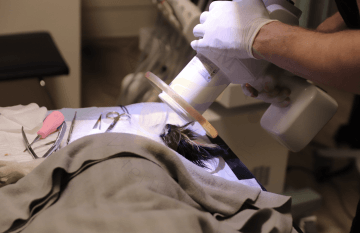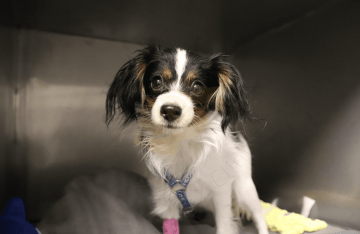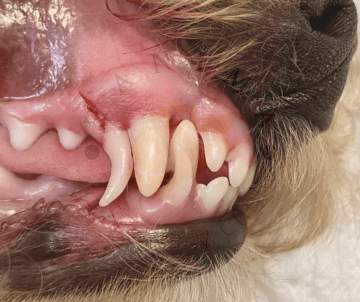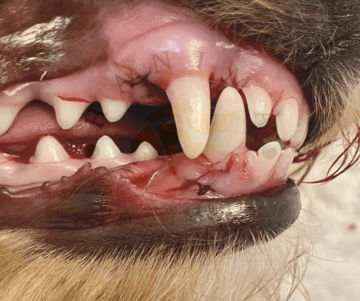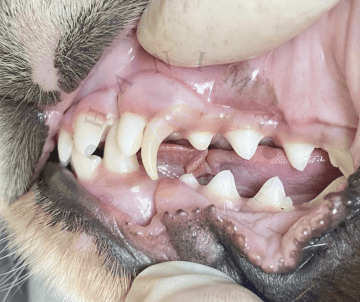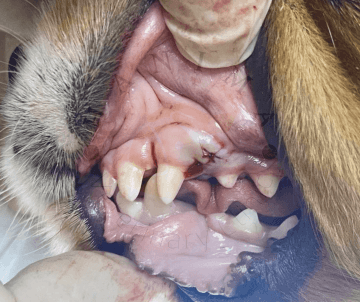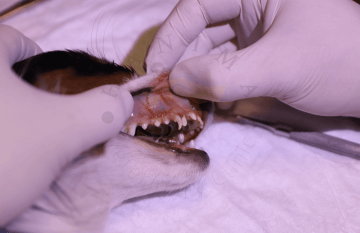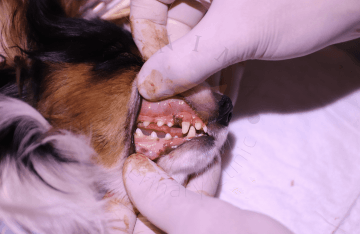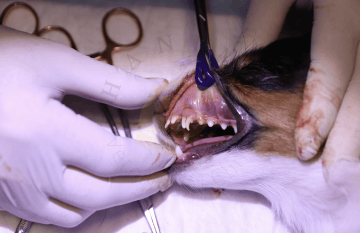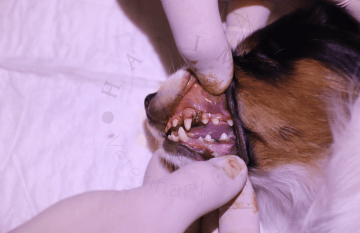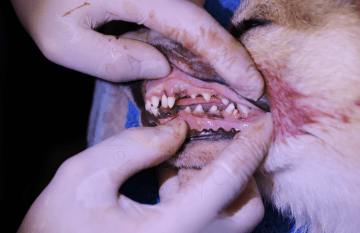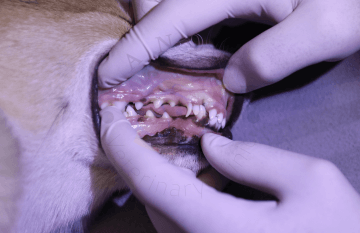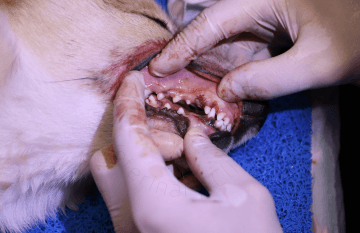Persistent baby teeth
Professional Dental Consultation
The first step before any dental procedure with us is always a professional dental consultation, also known as a dental examination. Without this, we are unable to determine the type, extent, or cost of the necessary dental or dental surgical procedure. We strive to approach our clients transparently to ensure that it is entirely clear what needs to be done and how much it will cost.
The price for a professional dental consultation is 940 CZK.
How many teeth do dogs have?
Just like humans, dogs have two sets of teeth in their lifetime. Puppies have 28 baby teeth also known as primary, temporary or baby teeth. Adult dogs have 42 permanent teeth, also known as secondary, permanent or adult teeth.
When do puppies get baby teeth?
Puppies are born without visible teeth. Baby teeth begin to erupt through the gums around three weeks of age, and usually by six weeks of age, all baby teeth are present. A healthy mouth depends on healthy teeth. The ideal time to start brushing your puppy's teeth starts as soon as you bring your puppy home. Gums are sensitive when teething, so gentle brushing is important during this time.
When do puppies get their permanent teeth?
In puppies, the whole teething process is quite fast. Teething begins in puppies at about 3½ to 4 months of age, when the baby incisors begin to be replaced by the permanent incisors. By 6 to 7 months of age, most puppies have all their adult teeth.
What happens during teething?
Long before adult teeth break through the gums, they begin to develop from tooth buds located in the upper and lower jaw. As the adult teeth develop, they begin to put pressure on the roots of the baby teeth, stimulating the roots of the baby teeth to begin resorption. As the roots resorb, the baby tooth crowns fall out. You can even find these "hollow shells" of baby teeth on the floor or in your puppy's bed. But very often he swallows them when he eats without any negative effect. During the teething process, your puppy may drool, may not eat with as much gusto as usual, and may be irritated due to a sensitive mouth. Almost all puppies have an urge to chew when they are teething. Do not allow your puppy to chew on shoes, clothes or furniture. Avoid hard toys, antlers, cow hooves and ice cubes as they can damage the teeth.
What is a permanent tooth? When and how to start treatment?
When a baby tooth is still present at the time a permanent tooth has started to erupt, it is referred to as a persistent tooth. In general, no two teeth should be in the same place at the same time.
If you notice a persistent baby tooth in your puppy's mouth, make an appointment for a dental examination as soon as possible. Permanent baby teeth usually need to be removed (erupted) quickly to avoid the secondary problems that occur with the erupting permanent counterpart. When this happens, the baby tooth takes up the space in the mouth meant for the permanent tooth, forcing the permanent tooth to erupt in an abnormal position. The end result is tooth crowding and possibly even abnormal tooth-to-tooth and/or soft oral tissue contact. Misaligned teeth result in an abnormal bite.
Which milk teeth are most often persistent?
The most common permanent baby teeth are the upper canines, followed by the lower canines and then the incisors. However, any baby teeth can be persistent. Persistent teeth are also more common in small breed dogs and in brachycephalic breeds (dogs with short noses or flat faces) such as bulldogs, pugs, Boston terriers and boxers. There may also be a genetic predisposition to developing persistent baby teeth.
How are persistent milk teeth treated?
Here the answer is quite simple - extraction is ALWAYS needed!
What problems do persistent baby teeth cause?
The crowding that results from the permanent baby teeth and their permanent counterparts will increase the likelihood of food and debris getting caught between the teeth. An increased tendency to accumulate food debris and plaque can lead to problems such as tartar, gingivitis and eventually periodontitis. In addition, if the teeth come into traumatic contact with other teeth or with the soft tissues of the oral cavity, pain and infection will occur. Improper contact of teeth with other teeth can lead to abnormal wear and weakening of the teeth, resulting in the fracture of the tooth (or teeth). Sometimes a persistent baby tooth can cause a tooth block, which can disrupt the normal growth and development of the jaws, which can result in malocclusion, which then needs to be solved with orthodontic methods.
For example, if the permanent baby tooth is a lower canine, the permanent lower canine is forced to cut through the inside of the permanent baby tooth, and when the adult tooth erupts, it may come into contact with the hard palate, causing pain and damage to your dog.
What can happen if the problem is not solved and we postpone the treatment?
Unfortunately, we often encounter cases where the extraction of persistent baby teeth is waited until the planned castration. If a persistent baby tooth is not extracted in time, it is unlikely that the adult teeth will be able to move into the correct position without orthodontic treatment. In these cases, or in puppies with severe malocclusion problems, it may be necessary to selectively extract additional teeth or use orthodontic appliances and procedures.
What else can I do?
In addition to regular (daily) brushing, it is important to check the puppy's mouth every week until the age of seven - eight months to make sure that the teeth are growing normally. If you discover any persistent baby teeth or if you suspect that your puppy has an abnormal bite, it is advisable to make an appointment at the veterinary clinic for a thorough oral examination.

